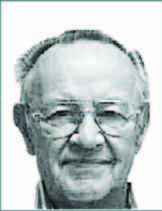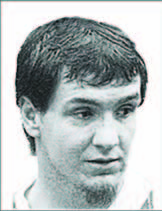By Leon J. Podles
Crossland Foundation
July 02, 2008
http://www.crosslandfoundation.org/case-studies/files/Pilger-Murder-Case-Study.pdf
| Victim |
 |
| Rev. Joseph J. Pilger |
| Murderer |
 |
| Jason Anthony Russel |
The Rev. Joseph Pilger, ordained in 1955, was assigned as a priest in several Kentucky parishes.
Dan Willett was twelve years old in 1958 when he met Pilger, who was stationed at St. Paul's
Church in Lexington, Kentucky. Willett's parents allowed him to accompany Pilger on a trip to
see the Cathedral Basilica of the Assumption in Covington.
On the way there, Pilger stopped at his father's house, and there, according to Willett,
[Pilger] pinned [Willett] down on a bed and tore his clothes off.
"He was telling me what he was going to do, and how I was going to enjoy it," Willett
said. He said he told Pilger to get off him and that Pilger's father would hear him scream.
Pilger said he could go ahead and scream, that his father was as deaf as a doornail.
As a 12-year-old fighting a grown man, Willett was overmatched. He said he finally got
Pilger to leave him alone by telling him he would run for help when Pilger fell asleep.1
For two years, Pilger continued to roughhouse with Willett and touch his genitals. When Willett
threatened to tell his parents, Pilger told him to go ahead: "Who do you think they will believe?"2
But there were other boys, and Willett remembered that in 1962, about six parents came to his
house and asked him if Pilger had ever done anything sexual with him. Willett admitted Pilger
had. The parents went to Bishop Richard Henry Ackerman, and Pilger disappeared from
Lexington for a stay at the Servants of the Paraclete in New Mexico.
After returning to Kentucky, Pilger was sent to the neighboring diocese of Owensboro. During
the late 1960s and early 1970s, when Pilger was stationed at St. Francis Church in Sturgis,
Kentucky, he abused four brothers and their cousin: James Lamb Long II; Michael R. Long;
Matthew Joseph Long; John M. Long; and Robert J. Long. All were under fifteen years of age.
The brothers said:
The priest would stand behind them while they were dressing for Mass and would fondle
them. They also said the priest would make excuses for them to go to the nearby rectory
where he would have them disrobe and abuse them.3
In 1993, the boys from the Long family filed a civil suit against Pilger and the diocese of
Owensboro. The court dismissed the civil case due to the statute of limitations. But Kentucky has
no statute of limitations on felonies, and in September 1993 Pilger was indicted on eighty-four
charges of sexual abuse.
Pilger, who was then sixty-nine years old, pleaded guilty to three of the counts, and received up
to 15 years in prison, to be probated if Pilger received counseling. Pilger would later regret
getting off so easy.
James Anthony Russell had an unhappy childhood. He said (and a later psychiatric evaluation
concurred) that his mother, "a heroin addict and a prostitute," put him and his sister in foster
homes, where he was physically and sexually abused.
As an adult, Russell was convicted of robbery and sentenced to prison, where he met a fellow
inmate, Earl Bierman, also a priest.5 Bierman had used the confessional to gain information
about boys' sexual lives, and used that information to initiate sexual encounters.6 He pleaded
guilty to sexual abuse and was serving twenty years. Bierman had an unspecified connection
with Pilger, and he told Russell to get in touch with Pilger. Russell began to write to Pilger.
Released from prison in October 2003, Russell, at age twenty-six, had no place to turn. He
looked up the seventy-eight-year-old Pilger (not knowing about Pilger's own conviction) and
moved in with him at 260 Pleasant Point Drive in Lexington, Kentucky. Pilger gave Russell food
and lodging, and asked him to do only one thing in return: walk around the house naked. Russell
was not worried about the request and later said, "I'm secure about my manhood, so I was like,
'all right.'"
Russell had a six-year-old son, and one day discovered Pilger masturbating with a photograph of
his son and other photographs of children from store catalogues. Russell didn't confront Pilger,
on whom he was dependent. Soon after, Pilger offered Russell $5,000 if he would arrange for
Pilger to have sex with his son. Russell stormed out of the house and drove to see his girlfriend
and son in Jacksonville, Florida. Weeks later, he drove back to Lexington, found a pickax that
was lying in the living room, and attacked Pilger.
Pilger's landlord soon became concerned that Pilger was not answering the phone. On December
5, 2003, he opened the door and discovered Pilger sitting in a recliner, covered in blood, with
wounds to the chest and head. The only one remaining with Pilger at the end was his beagle,
which was found lying near his body.
Dan Willett heard of the murder and felt pity for the seemingly unrepentant abuser: "It is not
what I would have wished for him. My feelings are that, unfortunately, he didn't make his peace
with God before it was too late."8 Pilger specified in his will that he did not want a Christian
burial.
Russell took Pilger's car and fled, but was arrested in Ironton, Ohio. The court appointed Russell
an attorney, and only then did Russell learn that Pilger was a convicted child molester.9
Russell pleaded guilty as part of a plea bargain; the district attorney could have asked for the
death penalty, but wondered how the jury would respond to the history of the murder victim,
Pilger. Not everyone echoed the sentiments of Willett. Michael Long wrote to the judge in
Russell's case that,
Russell "had done society a favor" by killing "a pedophile monster that preyed upon
innocent little boys while in a position of authority and calling himself a man of God."
"The damage a pedophile inflicts on young children is life-changing and life-long,"
Long said. "The entire emotional and developmental wiring of a child is changed forever.
Pedophiles are nothing but human debris. I have, for years, wished to do what Mr.
Russell did."
But Long also wondered if he had been too weak in 1995; what would have happened if he had
fought the plea bargain that kept Pilger out of prison, but that had led to his death and Russell's
conviction?
"If we would have been more adamant about his sentence, we would not be writing you
now, and Mr. Russell would not be where he is as well," Long said. "So you see, even
now after his death, I still feel guilt."
Judge Gary Payne, moved by this letter, rejected the prosecution's recommendation of life
without parole, and sentenced Russell to thirty years in prison.
Russell was not repentant: "I know you can't go around killing people, but I don't see where I
did anything wrong. I really ain't got no feelings for child molesters." Russell explained that he
pleaded guilty because, "It wasn't my place to take judgment on him. I'm not God." The only
deep regret that Russell had was for his son: "My son, he's going to be the one who suffers. I
told myself I don't want my son to experience the same thing I went through, without having a
dad. But it's too late for that."
Any original material on these pages is copyright © BishopAccountability.org 2004. Reproduce freely with attribution.